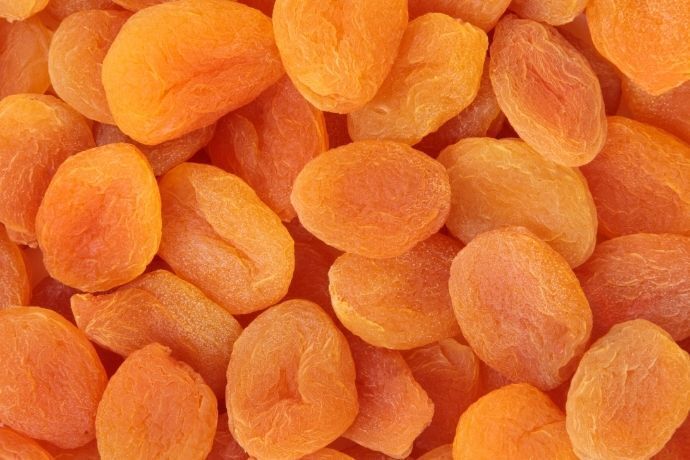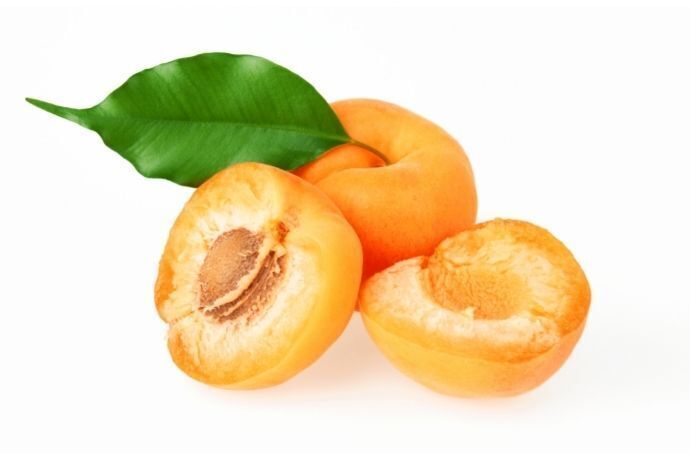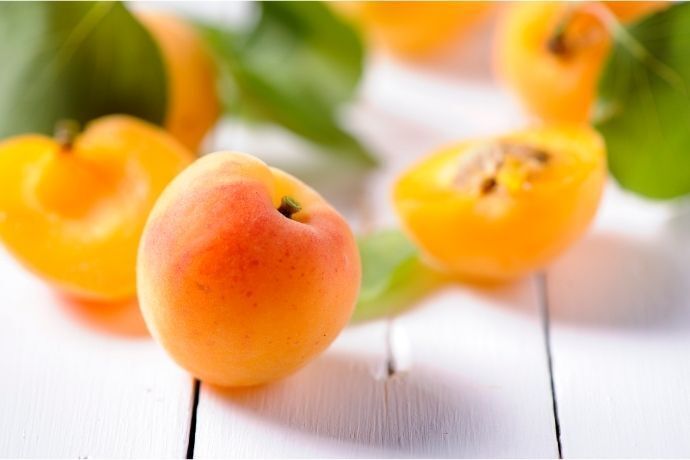Table of contents
General considerations on the benefits of apricots

Native to China and Siberia, the apricot comes from the apricot tree (Prunus armeniaca). The tree can reach a height of up to 8 meters and is currently planted in several countries, such as Turkey, Spain, Italy, France and Algeria. The fruit is also known as apricot and its color varies between yellow, orange and red.
Apricots are not widely grown in Brazil, so it is more common to find them dehydrated. The fruit has a sweet taste and is a source of vitamins, minerals and fiber. Both fresh and dried, it has many medicinal properties and is excellent for making jams, jellies, compotes and pies.
Throughout this article, you'll learn all about the nutrients it contains, its main health benefits and tips for consuming apricots on a daily basis. To find out more, read on.
Apricot's nutritional profile

Apricots have a high nutritional value: every 100g of fresh fruit contains around 48 calories, 11g of carbohydrates, 259mg of potassium, 13mg of calcium and 10mg of magnesium. They also contain good amounts of vitamins and fiber.
Dried fruit, on the other hand, is more caloric, with 241 calories per 100g and 62.2g of carbohydrates. Despite having undergone the dehydration process, there is a greater amount of potassium, around 1162mg, and 7.3g of fiber.
The fruit's chemical compounds offer complete nutrition and health benefits. Find out more about the main nutrients in apricots below.
Ellagic acid
Among the various components of apricots, ellagic acid is a phenolic compound with antioxidant and anti-cancer properties. Some research has shown that the substance inhibits the development of cancer cells, especially tumors in the esophagus and intestine.
This substance is also found in red fruits such as strawberries, blackberries, cherries, pomegranates, grapes and pecans. Ellagic acid is also responsible for the red color of fruits and for protecting them against parasites and bacteria.
Beta carotene
Beta-carotene is a natural pigment belonging to the group of carotenoids responsible for the coloring of some fruits and vegetables, as is the case with apricots. The component has an antioxidant effect that fights free radicals and is transformed in the body into vitamin A, being called Pro-Vitamin A.
The benefits of consuming beta-carotene every day are numerous: it prevents cardiovascular disease, protects bones, improves eyesight and fights premature ageing.
Therefore, foods with orange and reddish pigmentation, such as carrots, sweet potatoes, mangoes, peppers, pumpkin and apricots, should not be missing from your meals.
Lycopene
Another pigment that is part of the carotenoids is lycopene, an antioxidant substance found in orange and red foods, such as apricots, tomatoes, watermelon, guava and papaya.
It is very important to consume this component on a daily basis, as it helps to protect the body's cells against free radicals, preventing the development of cancer. In addition, the substance has other positive effects on the body, such as preventing eye, heart and bone diseases and even Alzheimer's.
Pectin
Pectin is a soluble fiber found in fruits and vegetables such as apricots, apples, oranges, beets, carrots and turnips, among others. This type of fiber has many health benefits. When it is absorbed by the stomach, it has a prebiotic action, feeding the good bacteria in the intestine.
In addition, it improves the digestive process by hydrating the fecal bolus and facilitating the elimination of stools. Pectin also helps to reduce high cholesterol, lowers blood sugar and creates a feeling of satiety.
Minerals
Mineral salts are essential for the proper functioning of the body and without one of them, there can be a series of imbalances in the body. Apricots contain magnesium, iron, potassium and phosphorus.
Together these components control blood pressure, improve blood circulation, prevent heart disease, help muscle contraction and many other benefits.
However, these substances are found in greater quantities in dried apricots. This is due to the process of drying the fruit, which concentrates these and other nutrients.
Vitamins
Apricots are a source of important vitamins for our bodies:
Vitamin C: It is an extremely important antioxidant for health, since the body cannot produce it on its own. Eating foods rich in this vitamin strengthens the immune system, fights free radicals, improves skin health and prevents serious illnesses;
Vitamin A: A micronutrient of animal (retinol) or plant origin (Pro-vitamin A) is essential for humans, especially for eye health and cell renewal. Thus, daily consumption improves vision and maintains ocular hydration, and also prevents skin aging;
B-complex vitamins: present in foods such as meat, vegetables, fruit and nuts, each B-complex vitamin acts in a specific way in the body. Together, they provide energy, protect the defense system, improve hair and skin health, and other important functions to keep the body healthy.
Fibers
Fiber should be consumed daily because it helps balance blood glucose levels, eliminates toxins in the body, reduces cholesterol and triglycerides, and improves intestinal transit. It also reduces hunger because fiber forms a gel in the stomach, preventing excess calorie intake.
Apricots, especially dried apricots, contain a good amount of fiber and there are a multitude of foods that are sources of this substance. It can be found in cereals, grains, vegetables, seeds and nuts.
The health benefits of apricots

As a source of important vitamins and minerals, apricots are a fruit that should not be missed in everyday life. Daily consumption replenishes nutrients and also prevents and combats various diseases, such as premature ageing and cardiovascular diseases. Check out these and many other health benefits below.
Good for eye health
Due to the presence of beta-carotene and vitamin A (retinol), apricots are excellent for protecting eye health. With frequent consumption, the fruit helps keep the retina healthy, preventing the onset of AMD, a macular degenerative disease that can cause gradual loss of vision.
In addition, the antioxidant action of these and other nutrients renews the eye cells, fighting free radicals, keeping the cornea lubricated and preventing cataracts.
Prevents heart disease
Rich in vitamins and fiber, apricots reduce bad cholesterol (LDL) and increase good cholesterol (HDL), so both fresh and dried apricots prevent hypertension and diabetes, as well as heart disease such as strokes and heart attacks.
The mineral salts also present in the fruit, especially potassium, have the function of replenishing electrolytes in the body, regulating metabolism and helping to eliminate excess sodium through the urine. In addition, it acts on muscle contraction, especially in the heart, which is very important for regulating heart rate.
Prevents premature aging
Apricots help keep skin looking young and beautiful because they are rich in vitamin C and vitamin A, powerful antioxidants that renew cells, fight free radicals and prevent premature ageing.
The concentration of these substances is higher when the fruit is ripe or in its dried version. However, dried apricots have more calories and sugar, so consumption should be moderate or avoided in the case of people with diabetes.
Good for the blood
The chemical composition of apricots contains a good amount of iron, a mineral that is essential for the blood. It therefore contributes to the production of hemoglobin, the component that transports oxygen throughout the body. It also plays an important role in combating iron deficiency anemia, due to a lack of the mineral.
Strengthens bones
The minerals in apricots, especially calcium and potassium, are essential for strengthening bones. Calcium is responsible for the formation of bones and potassium helps with the absorption and distribution of this mineral in the body.
In other words, to keep your bones and teeth strong, you need to consume these nutrients together. Otherwise, all the calcium you consume tends to enter the bloodstream, being expelled by the body or overloading other organs, such as the kidneys and bladder.
Prevents and fights cancer
According to studies, apricots have antioxidant and anti-cancer properties because they contain ellagic acid, a phenolic compound capable of fighting cancer cells. In addition to this substance, there are several nutrients, such as vitamins A, C and complex, which contribute to cancer prevention.
Strengthens the immune system
To boost immunity, it is very important to eat foods rich in vitamin C and A. Fruits such as apricots are high in these substances, which are essential for strengthening the immune system.
With its antioxidant and anti-inflammatory properties, it fights free radicals, preventing the oxidation of cells. It also stimulates the body to get rid of viruses and bacteria without causing major damage to the body, especially people with autoimmune diseases.
Combats constipation
Constipation often occurs due to a diet low in fiber, a substance that hydrates and stimulates the formation of the fecal bolus, facilitating the elimination of feces. Apricots are enriched with soluble fiber, which means they are diluted in water, forming a consistent and viscous mixture in the stomach.
The fruit helps speed up the metabolism and thus improves intestinal transit, combating constipation. However, apricots and other foods rich in fiber should be consumed daily. In addition, drinking the right amount of water is essential to ensure that these nutrients are absorbed.
Slimming ally
Healthy eating is fundamental to the process of losing weight, especially foods rich in fiber, as is the case with apricots. The fruit contains good amounts of fiber, such as pectin, which forms a consistent gel in the stomach when absorbed, reducing the desire to eat.
Apricots are also a great alternative for curbing cravings for sweets and contributing to weight loss. However, in order to lose weight healthily, you need to be disciplined and consistent. This means eating a balanced diet, exercising, sleeping well and cutting down on addictions to cigarettes and alcohol, for example.
Dried apricots, production and consumption

Apricots have a pleasant taste and can be eaten both fresh and dried. However, when the fruit is dehydrated, it has some nutritional differences compared to the fresh version. In this topic, you'll learn more about dried apricots, as well as its production process and ways to introduce it into your diet. Check it out below.
Dried apricots
Easily found in markets and available at all times of the year, dried apricots are an alternative for those who don't want to stop eating the fruit. Despite having undergone the dehydration process, they contain a higher concentration of nutrients than fresh fruit.
The nutritional value of dried fruit is that it is higher in fiber, potassium and iron, which are important substances for maintaining good intestinal transit and preventing anemia. However, it is higher in calories and has a higher content of carbohydrates and sugar, which is why it should be eaten in moderation, so as not to affect the health of the teeth and raise blood sugar levels.
How it is produced
Apricots are usually dehydrated in a dehydrator or in a conventional oven. To produce apricots, it is important that the fruit is ripe, as when it is still green, it tends to turn sour. Once the fruit has been picked, it is washed and the stone removed.
Then the center of the fruit should be pressed upwards, exposing the flesh. After this, the apricot is placed face up inside the dehydrator at a temperature of 57 degrees for around 10 to 12 hours.
To dry completely, turn the fruit over after 5 or 6 hours. When finished, store in a glass jar with a lid to preserve it for longer.
How to consume
Apricots can be eaten both dried and fresh. They are an excellent snack option and can be combined with other fruits, nuts and yoghurt. In addition, because they contain natural sugar, apricots can be substituted for refined sugar in cakes and pies, making them healthier and more nutritious.
If you find it uncomfortable to eat with the peel on, juicing can be an alternative to ensure that the vitamins are absorbed.
To be on the safe side, always opt for organic apricots to avoid ingesting pesticides and other harmful substances. Also, when choosing apricots, prefer them when they are yellowish or orange. Avoid reddish apricots because they contain sulphur dioxide and are therefore harmful to your health.
Add the fruit to your diet and enjoy all the benefits of apricots!

As we've seen, apricots contain a number of properties that keep the body functioning properly and help prevent and combat serious diseases, so as well as being tasty, adding the fruit to your diet, whether in fresh or dried form, will bring many benefits to your health.
But remember that although dried apricots have a higher nutritional value, they are also higher in calories, so you should be careful not to gain weight, damage your oral health or raise your blood sugar levels.
To get the most out of the fruit, combine it with other fruits and nutritious foods or make a diet plan with the help of a nutritionist. This way, you'll learn how to consume apricots according to your daily needs and your goals. This way, the fruit certainly can't be missing from your daily routine.

